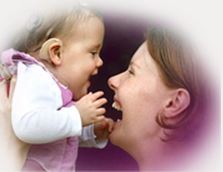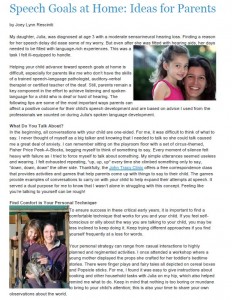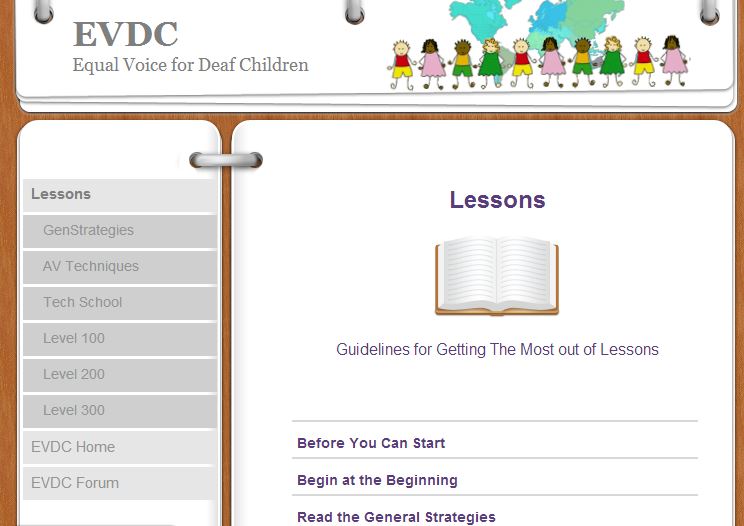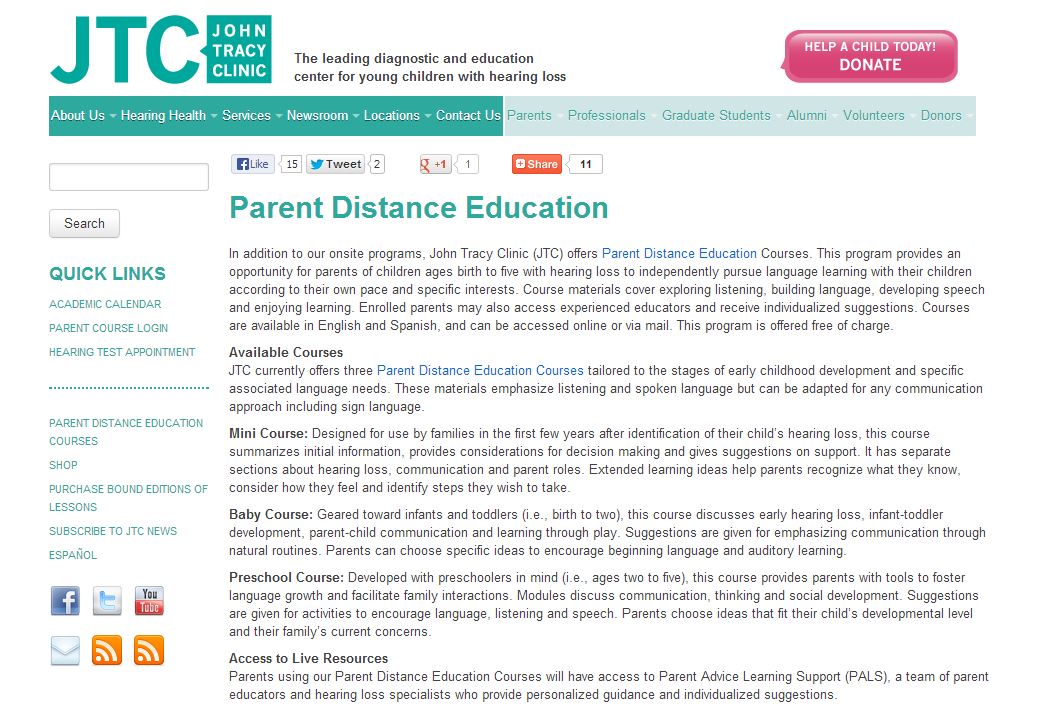Speech & Language Development at Home
Developing a child’s ability to speak clearly is not the priority of all families as “what works for your child is what makes the choice right.” However, now that universal newborn hearing screening has been available in most states of the U.S. for 10-15 years and families are being presented communication choices in an unbiased manner we are seeing increasing numbers of families who want their child to listen and speak.
Most states/local areas will have an early intervention option for families of infants and toddlers identified with permanent hearing loss.
Sometimes the model of early intervention means that your family will be served by someone who does not specialize in the early learning of children with hearing loss. This resource specifies why this is very important to the early (and lifelong) outcomes of your child. Even when your family receives services from a teacher of the deaf/hard of hearing, sometimes the services of a speech-language pathologist is denied – even if you have made it clear you want your child to learn to listen and speak. Why Your Young Child with Hearing Loss Needs Speech Services will help you understand the issues and why it is important to insist that a speech language pathologist be an active part of your early intervention team.
 Sound Foundation for Babies and Toddlers Cochlear Corporation has a suite of resources to assist with listening and language development from birth to 6 years of age. Free download! The Sound Foundation resources, by Nancy Caleffe-Schenck, offer week by week activities. Each week includes a video tutorial and attention specific to audition, receptive/expressive language, speech, songs, rhymes, etc.
Sound Foundation for Babies and Toddlers Cochlear Corporation has a suite of resources to assist with listening and language development from birth to 6 years of age. Free download! The Sound Foundation resources, by Nancy Caleffe-Schenck, offer week by week activities. Each week includes a video tutorial and attention specific to audition, receptive/expressive language, speech, songs, rhymes, etc.
There is much information available from many sources on early learning and early services for children with hearing loss. Below are just a few of these:
 Speech Goals at Home – Ideas for Parents is a 2-page article written by a parent who describes her struggles and successes in supporting her daughter’s speech and language development in the early years. My thanks to AG Bell for allowing the inclusion of this article. Key areas presented are:
Speech Goals at Home – Ideas for Parents is a 2-page article written by a parent who describes her struggles and successes in supporting her daughter’s speech and language development in the early years. My thanks to AG Bell for allowing the inclusion of this article. Key areas presented are:
What do you talk about?
Your personal technique
Adjust daily practice
Repeat target words and sounds
Maintain consistent and appropriate amplification
“With patience, perseverance, creativity and consistent amplification, you will find what everyday activities your child will respond to and feel confident in your contribution to the child’s speech and language development.”
 Equal Voice for Deaf Children is non-profit and freely provides ‘how to’ lessons via their website. For families who live remote from service providers or those who have service providers available to them with limited expertise in supporting the development of young children with hearing loss, this is a viable option to explore.
Equal Voice for Deaf Children is non-profit and freely provides ‘how to’ lessons via their website. For families who live remote from service providers or those who have service providers available to them with limited expertise in supporting the development of young children with hearing loss, this is a viable option to explore.
Public Service Video on Communication Development in Early Childhood
 The John Tracy Clinic has been providing distance learning options for families of children who are deaf or hard of hearing for decades! Distance learning courses are available in English and Spanish. The Baby Course is a great place to start learning about how to develop your baby’s language as you feed, play, change and do other things with him day-by-day. Other resources and supports are also available for distance learners. Services in general are at no cost.
The John Tracy Clinic has been providing distance learning options for families of children who are deaf or hard of hearing for decades! Distance learning courses are available in English and Spanish. The Baby Course is a great place to start learning about how to develop your baby’s language as you feed, play, change and do other things with him day-by-day. Other resources and supports are also available for distance learners. Services in general are at no cost.
Again, these are just a few of the many resources available! If you are a parent with a recently diagnosed child with hearing loss it is often overwhelming to think of all you have to learn! It is easiest to do so if you are in touch with another parent who has gone through all of the feelings that you are having and has also spent many hours of worry about their child’s future and how to best help him or her. Do not hesitate to contact Hands & Voices, a national group who can help you connect with people in your state. They have chapters in some other countries too!
Information posted on Supporting Success for Children with Hearing Loss, August 2013, October 2014.
